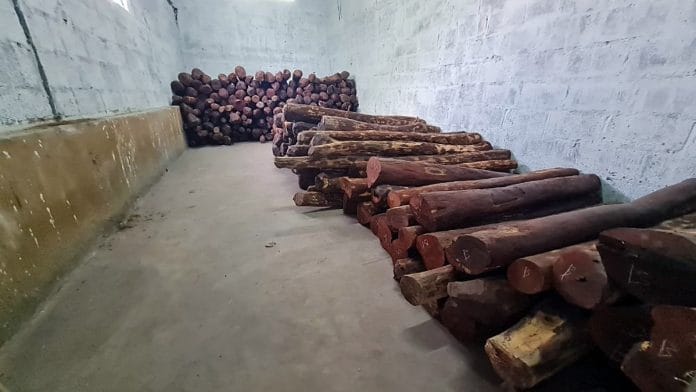Bengaluru: Karnataka’s forest department is on high alert following two major sandalwood seizures within weeks, which officials believe indicate an organised smuggling network that has been operating in multiple districts for years. A repeated pattern, from MM Hills to Cauvery to Mudigere, suggests that sandalwood smugglers have widened their base, spreading across Karnataka’s southern forest landscapes with precise planning, local collaboration and technical expertise in identifying and extracting sandalwood.
“These are not random thefts. The gangs know the terrain, the patrol timings, and even the administrative gaps. Each operation is executed with a very high level of precision,” a senior forest officer told ThePrint.
In one raid on 12 October in the MM Hills Sanctuary, where sandalwood smuggler Veerappan once operated, forest officials seized more than 100 kg of sandalwood, estimated to be worth several crores, marking one of the biggest hauls in recent years.
The raid, led by Assistant Conservator of Forests (ACF) Viraj and Range Forest Officers (RFOs) Umapati and Nagaraju, followed a tip-off about sandalwood stored in a house on the fringes of MM Hills Sanctuary in Chamarajanagar district’s Hanur Range.
When officials began their search, one of the occupants, Devamma, claimed the key to a locked cupboard was missing. After nearly half an hour of resistance, the team forced open the cupboard and found precisely cut and neatly stacked sandalwood logs hidden inside.
A 50-year-old woman, Rajamma, was arrested on the spot, while Devamma and her son, Suresha, managed to escape.
Preliminary investigations revealed that the operation was connected to the family of Dodda Hongayya, a known sandalwood smuggler active since the days of forest brigand Veerappan.
Hongayya, now paralysed after a stroke, is believed to have handed control of the illegal trade to his wife, Devamma, and two sons, who are now key suspects in the latest seizure.
The 12 October raid was not an isolated event. Just days earlier, on 8 October, Chikkamagaluru district’s Mudigere Territorial Range forest officials intercepted two men carrying sandalwood logs on a motorbike, posing as journalists.
The team led by ACF Akarsh, RFO Manjunath and Deputy RFO (DRFO) Ashwath received a tip-off about the suspects moving between villages under the guise of media. When forest personnel signalled them to stop, they tried to escape but were caught after a chase.
Forest officials seized sandalwood concealed in the motorcycle by the two men, identified as Yusuf and Mansoor. Although smaller in volume than the MM Hills raid, officials said the seized sandalwood appeared to be part of a steady chain of illegal movement running through the coffee belt toward transit points in other districts.
Officials said another incident in September indicated widespread cross-border smuggling using forest paths connecting Karnataka and Tamil Nadu.
On 24 September, forest personnel in MM Hills conducted a separate operation after spotting flickering torchlights deep inside the forest near Kokkabare Beat. When approached, the suspects attempted to flee; one was eventually caught after a chase.
His bag was found containing freshly cut sandalwood billets, roots, and tools used for felling and extraction. Interrogation revealed a small but well-trained group that worked exclusively at night, carrying sandalwood manually across forest trails to pre-arranged pickup points. Investigators suspect the gang involved in the 12 October raid may have regrouped after the September crackdown and resumed operations on a larger scale.
Meanwhile, forest department sources have also confirmed recent incidents of sandalwood felling inside the Cauvery Sanctuary, particularly near Anti-Poaching Camps (APCs).
In some places, trees have reportedly been cut within visible range, raising fears of insider assistance or poor field surveillance.
Also Read: ‘We want our forest produce back.’ Naidu govt looks to benefit from sale of seized red sanders logs
Protected species
Officials say sandalwood-related cases have sharply increased over the past year, especially across forest divisions in Chamarajanagar, Mysuru, Shivamogga and Chikkamagaluru.
Many of these involve organised groups using new disguises, small transport units, and interstate routes to move wood toward processing hubs.
Although Karnataka has severe penalties for smuggling sandalwood, which is regarded as a state-owned resource and is a protected species under the Karnataka Forest Act 1963, it is difficult to enforce laws in the state’s dense forests.
As a result, sandalwood smuggling is still common to satisfy the high demand for carving and perfumes in both domestic and foreign markets.
Given the scale of operations and recurrence of cases, forest officers have called for a separate, high-level inquiry into all sandalwood cases registered so far—including the raids in MM Hills, the Mudigere case and the incidents in Cauvery Sanctuary.
The proposed inquiry, headed by a retired High Court judge or senior independent authority, would investigate the entire chain of operations, from tree felling to inter-state transit, storage and sale, while also identifying institutional lapses that may have allowed the trade to thrive.
“The pattern is too clear to ignore,” a senior officer said. “Each case is part of a much larger structure. Unless a full-fledged enquiry examines all sandalwood operations across Karnataka, we’ll only keep catching the smaller players, not the masterminds.”
Tejus RS is an alum of ThePrint School of Journalism, currently interning with ThePrint.
(Edited by Sugita Katyal)
Also Read: Veerappan was target of India’s costliest manhunt. Now, he’s a staple in true crime stories






